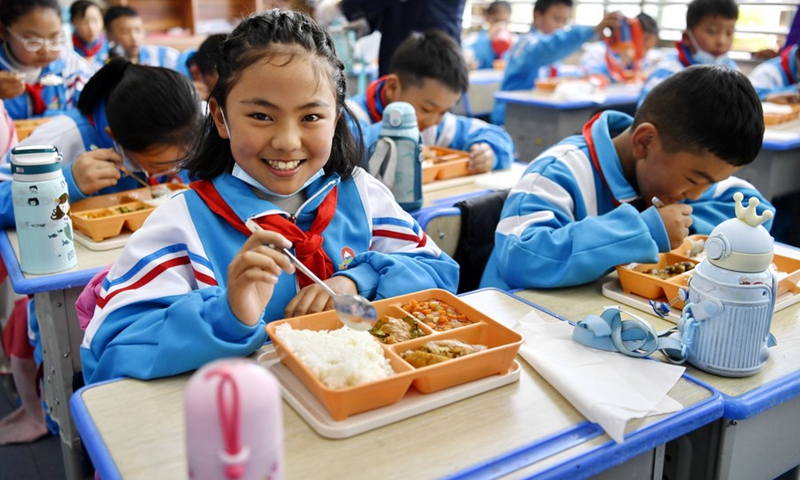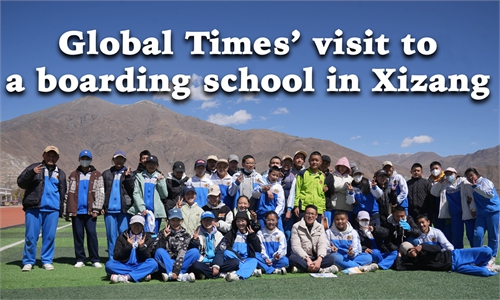
Students of a branch school of Lhasa Experimental Primary School have lunch in Lhasa, southwest China's Tibet Autonomous Region, May 12, 2022.(Photo: Xinhua)
As a Tibetan folk saying goes, "Good things tend to be smeared for no reason." Some people in the West have a well-known "hobby" of smearing China with the best things China has done. In fact, they have "dropped a stone on their own feet."Since the peaceful liberation of Southwest China's Xizang Autonomous Region, the historic achievements and changes in education in Xizang are a vivid reflection of the Communist Party of China's commitment to putting the people first. The development of education has its own rules. It depends on the region's unique geographical environment and cultural endowment.
Located in the southwest border of China, Xizang is vast and sparsely populated. It has an area of 1.2 million square kilometers, but only over 3.6 million people live in the region, with an average population density of 3.04 people per square kilometer. Most remote areas have a lower population density.
In order to provide more equal and high-quality educational resources to all parts of Xizang, the regional government has adopted a model of education that combines day schooling with boarding. Boarding schools, for example, have, to a large extent, overcome Xizang's unique difficulties in geography, transportation, and inequity in educational resources. They have met to the greatest extent the needs of people of all ethnic groups for access to modern education, especially the needs for quality education.
People of all ethnic groups in the Xizang region have the best say in whether boarding schools are good or not. I myself have experienced and benefited from boarding schools. After graduating from senior high school, I was admitted to a school in Beijing. Later, I received a PhD degree in political science from leading Peking University and worked in the mainland for more than 10 years.
After graduation, I engaged in academic research, during which I had the honor to be an official in a county in Xizang for a period of time. Now I am teaching in a school featuring ethnic minority research. I have personally experienced the development of education in Xizang and also have long-term research on the education situation of farmers and herdsmen.
Studies have proven that boarding schools are the most ideal, effective, and efficient mode of running schools for the children of all ethnic groups in Xizang region under current conditions. First, boarding schools are very flexible. Students go to school from Monday to Friday and return to their hometowns for reunion on weekends. In the meantime, a "big weekend system" is also arranged to create conditions as far as possible for students to reunite with their families after ensuring the completion of various academic tasks. All expenses, such as round-trip transportation and boarding fees, are borne by the schools.
Secondly, the teaching content is very scientific. Students at boarding schools not only learn courses for all school ages, but also courses in various forms such as Tibetan folk stories, Tibetan calligraphy, and Tibetan maxims. Students can not only learn modern scientific knowledge, but also the essence of traditional Tibetan culture.
Third, in addition to infrastructure construction and modern teaching equipment, there are also classrooms and teaching equipment with the characteristics of Tibetan traditional culture. At the same time, in the aspect of diet, the schools pay attention to the healthy nutrition of students. In addition, for a long time, under the special care and policy support of the central government, the "education aid to Xizang" has greatly made up for the shortage of educational resources in the region. All kinds of education and teaching resources were deployed to all parts of Xizang, injecting new power into the development of education in the region. The children of all ethnic groups on the snowy Plateau, together with other parts of the inland cities in China, can fully enjoy modern education with local characteristics.
In a word, Xizang has witnessed the leapfrog development of education, from a handful of schools in the early days after its peaceful liberation to the primitive conditions of "tent schools" and "schools on horseback" before and after the reform and opening-up, to the current equal and high-quality schools throughout the region. The historic achievements in the development of education in Xizang, including a variety of modern teaching in boarding schools, have fostered tens of thousands of outstanding students for the modernization of Xizang region and even for the modernization of China.
This not only demonstrates the scientific, efficient and inclusive nature of Xizang regional educational system, but also profoundly indicates that the human rights of the contemporary Tibetan people, with the right to education as the main focus, are fully protected and developed. I believe that with the acceleration of Chinese modernization, all undertakings in Xizang region, including education, will embrace the best period of development opportunities. Boarding schools in Xizang are doing better and better, and the educational undertakings in the region will have a promising future.
The author is Deputy Dean of School of Marxism with the Sichuan Minzu College. opinion@globaltimes.com.cn

